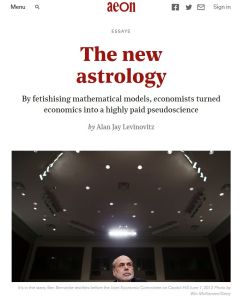Join getAbstract to access the summary!

Join getAbstract to access the summary!
Alan Jay Levinovitz
The New Astrology
Aeon, 2016
What's inside?
Has the idealization of mathematical modeling blinded society to economic theory’s frequent inaccuracies?
Recommendation
At what point does good math become bad science? Philosophy and religion professor Alan Jay Levinovitz critiques the “talismanic authority” of little-understood mathematic models that lend an aura of scientific truth to economic theories that may not deserve such designation. In the course of his analysis, Levinovitz draws insightful parallels between the “quasi-theology” of ancient China’s adherence to “li models” and modern-day belief in the predictive power of economic theory. getAbstract recommends this article to policy makers, executives and investors.
Summary
About the Author
Alan Jay Levinovitz is an assistant professor of philosophy and religion at James Madison University. His most recent book, The Gluten Lie: And Other Myths About What You Eat, was published in 2015.

















Comment on this summary